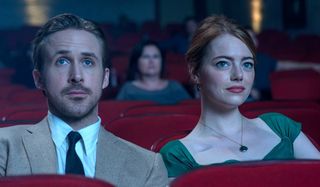La La Land’s Ending: How Damien Chazelle Pulled It Off

Very few directors know how to end a movie quite like Damien Chazelle. Think about his tense, conflicting jazz-drummer drama, Whiplash. The back-and-forth between Miles Teller's student and JK Simmons' teacher built seamlessly to a live confrontation that ultimately awoke the true genius in Teller's performer... just as Simmons had been predicting over the course of the entire movie. Chazelle's latest film, La La Land, has an equally perfect and ridiculously satisfying ending, so when I say down with the filmmaker to talk about his process, I had to ask him how he comes up ,with his conclusions, because sticking the landing is a LOT harder to do in a movie than audience members may realize. (Right, Passengers?)
Needless to say, there will be spoilers for La La Land from here on out, so you might want to stop reading now if you haven't yet seen the film. And GO see the film!
The final act of Damien Chazelle's La La Land takes place five years after the main action of the mesmerizing musical. Mia (Emma Stone), a struggling actress, has finally found success -- though her path took her away from Sebastian (Ryan Gosling), the man she was courting during her rough patch. When we catch up with Mia, she's married to a new man, and while the couple is on the town, they stumble into a jazz club. Sebastian's jazz club, to be specific. The two haven't seen each other in five years. Their eyes meet, and as Sebastian plays the piano, we are treated to a heart-wrenching and uplifting montage of the life he and Mia might have lived, if life played out differently.
It's such a perfectly crafted finale, I had to ask Damien Chazelle if he came up with the ending to La La Land first, and then backfilled his story to make sure that he built to it properly. And he explained to me:
I think that's probably a definite similarity in terms of, certainly this and Whiplash, was that the ending was more or less exactly what it is in the film, pretty early on, but it's the stuff that led up to it that gets rewritten a ton and gets reshaped.Because you know you have to get to a certain point?Yeah, and it's always about, like, I guess it's a way that I like writing. It's not that I literally write the last scene first, but it's just nice to know what your destination is, and then just backtrack, or figure out what is the most elegant way to build to that. What are the things I need to seed in order for this moment to work the way I want it to work. And in a way, the whole movie becomes that. I think with this movie, Tom and I -- my editor -- the ending was the first thing we cut in the cutting room, before we touched any of the rest of the movie. And then we circled, you know, we got that feeling perfect or perfect enough, so that we knew...You mean the montage of their life together?Yeah, everything. Probably, even earlier. As soon as we cut five years ahead in time. Everything from that moment to the cut to black at the end, we edited that first, before editing anything else, to make sure that felt good, to try to get it down to a somewhat reasonable length, you know? And then we're like, 'OK, great, now we have the goal!' And now we work towards it. We did something somewhat similar with Whiplash. I don't know if we started literally with the Carnegie Hall climax, but it was certainly one of the earliest things that we really cut in an in-depth form.
You can tell that the conclusions of Damien Chazelle's films are so beautifully constructed and meticulously crafted, a ton of forethought has to go into their plotting and planning, because especially with La La Land, the montage has so many brilliant callbacks to the entirety of the film. We essentially are watching a new cut of the same actions, only with tweaks that would reflect different decisions in Mia and Sebastian's lives. It's melodramatic and sad, even though -- like their director -- they both get to where they are supposed to be going.
La La Land is in theaters as we speak, and will be expanding to more locations in the coming weeks. It is a MUST see.
CINEMABLEND NEWSLETTER
Your Daily Blend of Entertainment News

Sean O’Connell is a journalist and CinemaBlend’s Managing Editor. Having been with the site since 2011, Sean interviewed myriad directors, actors and producers, and created ReelBlend, which he proudly cohosts with Jake Hamilton and Kevin McCarthy. And he's the author of RELEASE THE SNYDER CUT, the Spider-Man history book WITH GREAT POWER, and an upcoming book about Bruce Willis.
Most Popular


